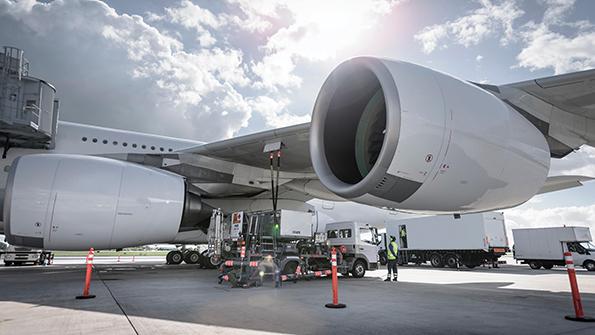Feedstock Is At Stake In EU’s Sustainable Aviation Fuel Mandate Talks

European carriers agree that SAF feedstock sustainability criteria should be strict in order to maintain passenger trust.
Arriving at the Parlamentarium, the visitors’ center at the European Parliament in Brussels, visitors are offered a brief but enlightening role-playing game. Acting as a member of the Parliament, visitors must take a stance on a thorny environmental issue. From the perspective of an average citizen, the choice seems obvious. However, when the pros and the cons are explained at a fair level of technical detail, visitors can see the real relevance of the game: Making a choice is strikingly taxing.
That fictitious decision-making process has often been the stark reality at the European Parliament and is now the case with ReFuelEU. The eagerly awaited legislation that will cover the region’s sustainable aviation fuel (SAF) mandates involves intricate technological choices. More important, the societal implications of relying on any given energy source will be felt for decades.
- Oil majors are not investing enough in e-fuels, green group says
- Palm oil byproducts are likely to be ruled out
That explains why the process has been a protracted one. That also explains why environmentalists have challenged recent laws on decarbonization after seeing the initial impact and why they are now more closely scrutinizing the lawmaking process. The ReFuelEU discussions are expected to restart soon and conclude within weeks.
At the very least, all involved want to avoid a repeat of the fiasco surrounding first-generation biofuels. Growing dedicated energy crops had created competition with food needs. Prices for basic cereals skyrocketed and riots ensued in some countries.
The new legislation on fuels aims to avoid the purposeful cultivation of fields. It would instead essentially rely on the use of waste as well as synthetic fuels (also known as e-fuels). SAF include advanced biofuels—as opposed to crop-based biofuels—and e-fuels. At issue is whether enough waste will be available and whether sufficient investments will be directed toward the production of e-fuels, including hydrogen as an ingredient.
For advanced biofuels, the feedstock is limited. That is why 17 environmental organizations published a letter in 2021 urging the EU to focus on e-fuels produced with additional renewable electricity and—whenever CO2 is required—direct air capture. A major benefit of e-fuels versus hydrogen is that they can be used in existing aircraft.
Transport & Environment (T&E), an influential Brussels-based nongovernmental organization, recently expressed concern that the level of investment in e-fuel production capacity is too low. Major oil companies are starting to invest in hydrogen and e-fuels as transport fuel, T&E acknowledges. But the budget for biofuels refining is about eight times higher than the €3.3 billion ($3.6 billion) investment planned for hydrogen and e-fuels by 2030, T&E estimates.
“The Renewable Energy Directive, which is EU law, pushes renewable energies for the transport sector but also encourages the decarbonization of intermediate processes,” Geert Decock, T&E’s electricity and energy manager, explains. “Using green hydrogen in their refining processes counts toward their own targets.”
Even worse, according to T&E, oil companies are investing primarily in deploying large-scale CO2 capture and storage facilities for the processes that create hydrogen from fossil resources. Green hydrogen production receives a minimal share.
If major oil producers do not put their money where their mouths are, could startup companies play that role? “Producing green hydrogen is a major industrial project, involving infrastructure, such as a wind farm and electrolyzers,” Decock says. “That calls for massive capital expenditures. Oil majors are well placed.”
In contrast, T&E’s experts fear that the current strong investment in production capacity for hydrotreated vegetable oils (HVO, also known as hydroprocessed esters and fatty acids, or HEFA) is incompatible with a sustainable approach. The investment in HVO plants is set to be €2-3 billion, doubling production capacity to 10 million metric tons by 2030. That amount is four times more than what can be sustainably sourced in the EU, according to T&E. “This will lead to competition with other users and imports of dubious feedstock,” Decock says.
The European Parliament has excluded some controversial feedstocks, such as palm oil byproducts. Lobbying group Airlines for Europe and airline EasyJet agree that feedstock sustainability criteria should be strict; otherwise, passenger trust could be compromised.
Before the mandate is adopted, the European Commission, European Parliament and European Council will have further tripartite meetings, or what the EU calls trilogues. “We hope that once we have the ReFuelEU legislation,” Decock says, “it will be more attractive for oil majors to invest in e-fuels.”





